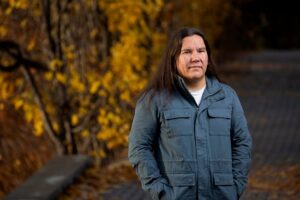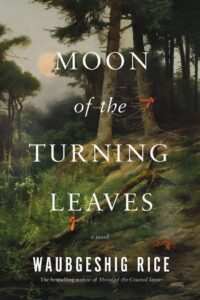Waubgeshig Rice proud of his thrilling new novel

By Kelly Anne Smith
N’SWAKAMOK/SUDBURY— Waubgeshig Rice says his gripping new book, Moon of the Turning Leaves, lauds Anishinaabe culture and Anishinaabe people. In conversation with the Wasauksing First Nation author, Waubgeshig talks of his sequel to the bestselling, Moon of the Crusted Snow, which sold over 100,000 audio and paper books. He knew he wanted to start with a birth.
It’s been 10 years in the story since readers followed Evan Whitesky. Society collapsed, forcing him to lead the community off the reserve to survive and thrive in the bush in traditional ways.
As Rice began to write Moon of the Turning Leaves, the world locked down against the Covid-19 pandemic. Waub’s wife Sarah was about seven months pregnant when everything changed in March 2020.
“He was born in June, Ayaabe, and it was just the most ideal timing, I think, for us to welcome our second child out into the world, because those times were so confusing and kinda scary. It was the ultimate celebration and really reminded us that we have to keep a good attitude and ensure that there’s love and hope for his brother and then another brother was born since then too, ” chuckles Waubgeshig. “It really helped me keep things in perspective about the future.”
As in the Moon of the Turning Leaves dedication, Ayaabe was that guiding light for Sarah and Waub in the first pandemic months.
“I think that’s really what inspired me to keep more of a hopeful theme in Moon of the Turning Leaves, despite all the uncertainty in the story and all the violence in the story, the characters are really hopeful that they can start over in their homeland and they’ll be able to find their relatives or their community and chart a new path forward.”
Inspired by witnessing Ayaabe’s birth, Waub wanted to write about a birth to begin Moon of the Turning Leaves.
“A birth is regeneration in many ways. It’s the celebration. It’s the extension of community, of a people, and family. After the first book, there’s so much death in that, despite the hopeful outcome of that book, too, there’s a lot of really heavy things and I thought I really need to start this next one off, I think to hit the reset button, and show a birth. Show that these people are resilient. They survived this latest catastrophe in their history. And they’re strong. And the babies and the children, the next generation is what is empowering them to be stronger and to look to the future.”
Waubgeshig gives a shout out, “to the Anishinaabe and Indigenous midwives who are doing great work to restore birthing customs in our communities and ensure that pregnant women don’t have to leave their communities to go to the hospital in a far-off town or city, that they can give birth at home.”
Close to home, Waub calls on his father as his main reference point for anything culturally or historically Anishinaabe.
“He has been on a journey most of his life to understand those ways and to find that identity. I was a little kid when he first started drumming and doing ceremonies. I had that sort of demonstration happening before me since a young age. So, when I need to check in on something, I always ask him. You have to be really sensitive about what cultural truth you share in fiction and just what exactly you put out there. My mom, who is settler Canadian descent, really supported my dad on his journey when he was younger and we were little kids, to find those ways to share them with us.”

His new book informs of terrible legacies of colonialism, with Rice feeling responsible as a writer or storyteller to share truths in different ways.
“I’m trying to fictionalize some real experiences and put them in an entertaining, or approachable or accessible story that people can sort of connect with. When you consider the shared histories a lot of Indigenous people have, there are common themes of displacement, of colonial brutality in the form of legislation, to kids being apprehended to go to Residential School, to unfair human rights violations that have persisted since the inception of Canada and countries like the United States, and Australia, and so on. So, that’s really where that comes from, is just to say, ‘Hey, this is part of an actual experience that many people share and it really trickles down through to our day-to-day practices and it really impacts who we are as Indigenous people and how we are trying to walk forward in this world.'”
The colonialist antagonist of the Moon series, Waub explains, is Zhaaganaash.
“Of course, the settler authorities who impose these things on us, and who oppress us and so on, are the bad guys for sure but not all white people are bad guys obviously. There are white characters in the story that are allies in part of their communities, too. But there’s a bad spirit of removal and violation and violence that has been rooted in colonization. It’s been about violently removing Indigenous people from their lands and then brutalizing their bodies and spirits since then, to ensure they remain weak or aren’t able to, I think, fulfill their human desires.”
Waubgeshig continues to have his characters speak Anishinaabemowin in Moon of the Turning Leaves, for the sake of representation, he says, “because it’s not gone.”
“Even though this is an English text, we have this language still available to us and it still lives on, despite what it has endured so here are some examples of people speaking it because that obviously still happens in our communities nowadays. The language itself is at risk as is every other Indigenous language, but there are efforts I think, by a lot of people especially in our region, to revive the language and that younger people especially have access to it and can learn it proudly.”
Waub gives another shout out, this time to his brother Mskwaankwad Rice and his peers and colleagues who are part of the language restoration initiative.
“They work with excellent, brilliant speakers and teachers like Dr. Mary Ann Corbiere, who was really helpful to me in making sure the language I used in the book was accurate. I don’t want to misrepresent my own skills. I probably have the skills of a toddler when it comes to actually speaking the language. I did ask Mary Ann if she could help go over the language that I wrote in there and make sure that the grammar was right and some of the nuances of dialogue were realistic. I don’t know if that can be inspirational to people just by seeing little examples of the language in a novel but if it does, that means a lot to me. I’m grateful. And that’s entirely the reason to put it in there so people can see it and maybe be proud of it or learn something from it, too.”
His 2003 black-out experience in Ontario was the genesis of calamity for Waubgeshig’s characters. Asked if he had a solar system to ensure Metallica plays on, Waub talked about having an emergency plan in place.
“Since I embarked on exploring these stories and this world more than a decade ago, I’ve thought more about how I and my family could ensure our survival in case something this extreme happens. I wouldn’t say we’re full on preppers, but we do have plans and we do have some supplies. I think we could do better in that sense. I don’t know if the music will last but as long as we are able to keep each other fed and warm, that’s the priority.”
Being an Anishinaabe story is the one thing the author hopes come through in Moon of the Turning Leaves.
“That it is inspired by my upbringing in an Anishinaabe community and also living now in Anishinaabe territory and seeing the efforts over the course of my life by Anishinaabe to ensure that we have our culture and language, ceremony and other customs still. And I wanted to show in this book that even after another apocalyptic moment, those are the things that are still going to keep us together. And that sense of community that has prevailed despite settler colonialism dividing us and brutalizing us, we still know how to come together and be proud of ourselves. And we can look to the future with that spirit of hope because of that unity we’ve been able to really hold on to and demonstrate to the rest of the world. That’s one of the values that I wanted to embrace in writing this story. And I really wanted to make it an homage to Anishinaabe culture and Anishinaabe people.”
Waubgeshig Rice says it is a proud moment for him to have Moon of the Turning Leaves in book stores and to be able to call it a story that’s rooted in Anishinaabe history and identity and culture.

